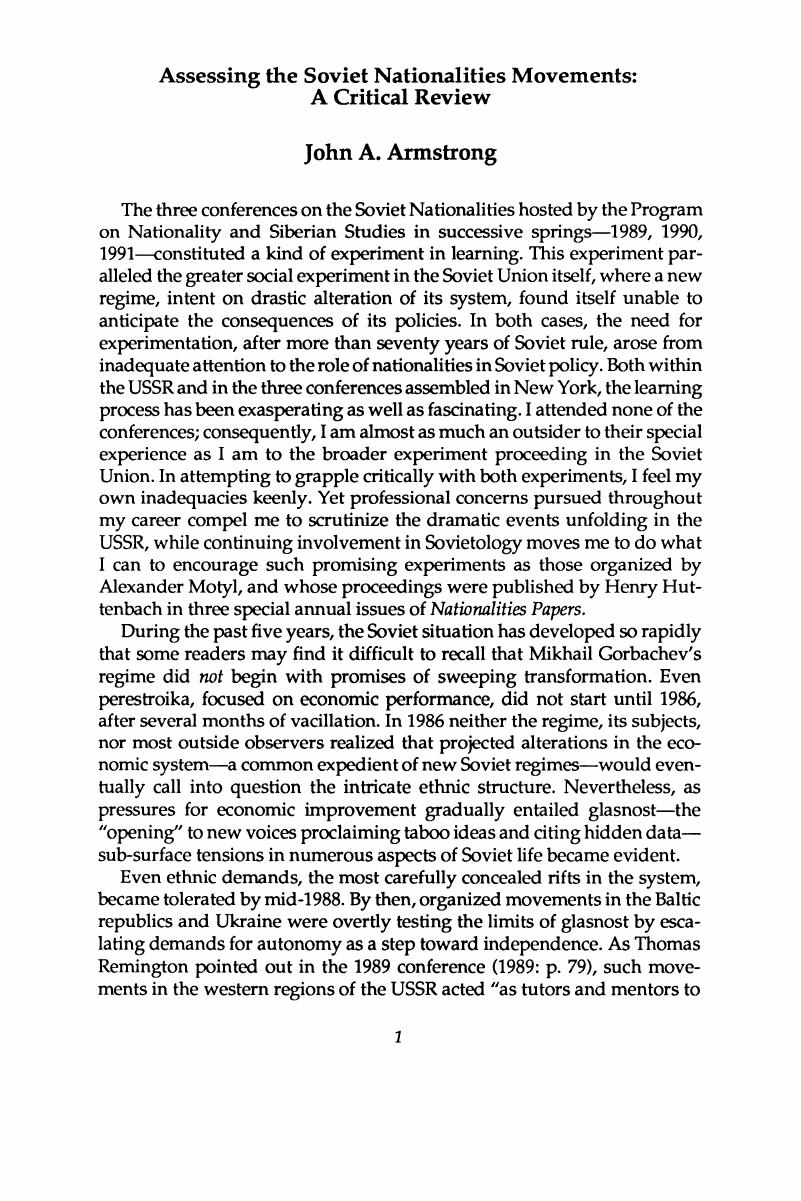No CrossRef data available.
Article contents
Assessing the Soviet Nationalities Movements: A Critical Review
Published online by Cambridge University Press: 20 November 2018
Abstract

- Type
- Other
- Information
- Nationalities Papers , Volume 19 , Issue 1: Special Issue - The Soviet Nationalities despite Gorbachev , Spring 1991 , pp. 1 - 18
- Copyright
- Copyright © 1991 by the Association for the Study of the Nationalities of the USSR and Eastern Europe, Inc.
References
1 I cite individual conference participants by name, conference year, and page of proceedings. While holding other source citations to a minimum, it seems fair that the participants should be given the sources of my contentions and criticism.Google Scholar
2 The Georgian Republic had been forcibly annexed in 1921. As I wrote in 1968, Georgia, Moldova, and the three Baltic republics with recent histories as independent polities, are all “state nations.” Armenia, the territorial remnant of a diaspora nation, had been created with some Soviet assistance; it turned to demanding independence only after Moscow's option for its Azeri enemies became evident.Google Scholar
3 An example was the churlish Moscow warning that an independent Lithuania would have to surrender “Stalin's gifts.” These included Vilnius, where a majority of the Polish population indicated (despite regime pressure) it would be satisfied with cultural autonomy in a free Lithuania (Commission on Security and Cooperation in Europe, Elections, p. 22; cf. Huttenbach, 1990: p. 51). More outrageous was the inclusion of Klaipeda in Moscow's warning. Seized by Hitler from Lithuania, the seaport had been retained with Stalin's consent (at one point he was prepared to concede all Lithuania to Germany) during 1939–41. In effect Moscow is hinting that Lithuania must pay for the return of a city that Stalin helped Hitler to steal.Google Scholar
4 This classification does not embrace all ethnic groups. The hitherto important type “mobilized diasporas” is no longer, due to emigration, salient. The bulk of Armenians have recently been acting like a “state nation.”Google Scholar
5 There are, of course, numerous groups of intrinsic cultural importance too small to exercise great influence. Since the 1991 Conference a comprehensive (though inevitably incomplete) survey of the Treaty voting process has been published by the Commission on Security and Cooperation in Europe, Referendum in the Soviet Union, (Washington, 1991).Google Scholar
6 An English-language version of the unpublished paper in Catalan presented at the University of Barcelona, “Immigrants russos a Estonia” was made available to me.Google Scholar




